Still surprised to be here (part 1, Tolkien's LOTR)
And with "here" I mean on Live Journal! Even a few months ago I would never have dreamed that I would spend time on the Internet or that I would take an LJ account. In this (and the following) post I want to record how it happened. Because I feel a bit like a hobbit:
"they liked to have books filled with things they already know, set out fair and square with no contradictions".
The words "things they already know" are so true for this post. It's impossible to write anything new about Tolkien, Lord of the Rings, the book, the films, Frodo and his actor. So this is just my own, personal story.
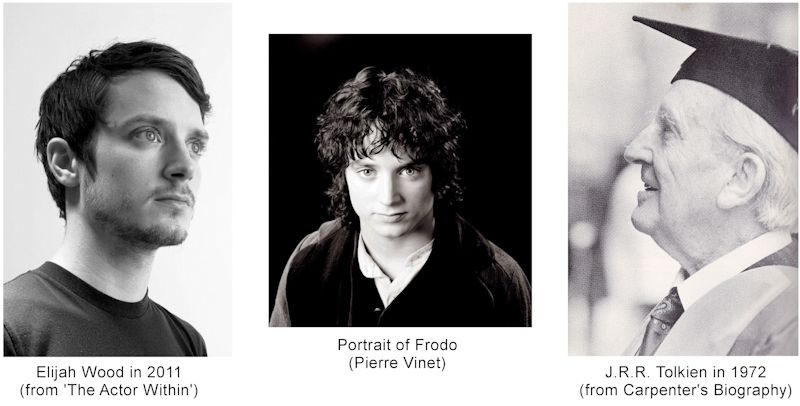
The first step on my journey was set years ago, when I first read J.R.R. Tolkien's "In de Ban van de Ring" (in Dutch). I got the book from my buddies at work. It was a hard-cover, cloth-bound edition with attached bookmarker (very convenient as it was 1445 pages long) and it had this dust cover.
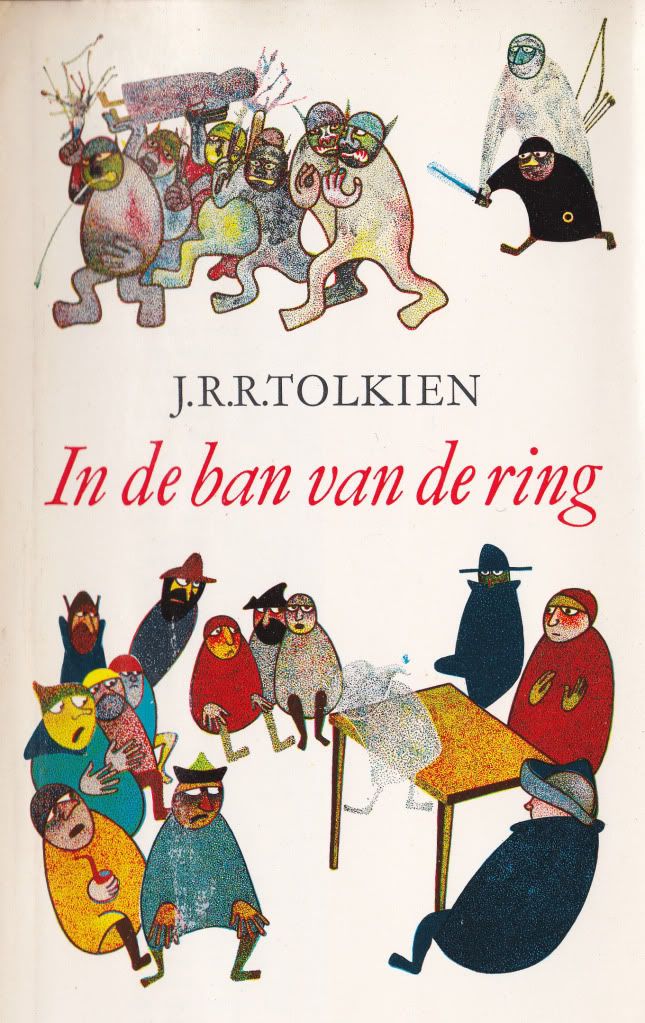
Cover of "In de Ban van de Ring" by J.R.R. Tolkien
translated by Max Schuchart (Uitgevery Het Spectrum, 1968)
Once I had read the book, I tried to figure out what these drawings could possibly mean. At the top I could see Frodo being carried off by the orcs, with Sam, brandishing Sting, in pursuit. I did not yet pick up the "great Elf-warrior" reference (which is what the artist must have intended for the shadowy figure looming above Sam). The scene at the bottom was clearly from the Prancing Pony, with Strider in the background and Frodo caught in his disappearing act. But the hobbits and the men of Bree were drawn as if this was a book for children but I already knew that it was nothing of the kind.
During the months that followed, I became completely absorbed by the world of Middle Earth. Once I had finished the book, I started right at the beginning again. I just could not let it go. Later on, when my English improved, I switched to the English version and then I discovered that the Dutch translator (although doing a great job) had made one serious mistake. During the Battle on the Pelennor Fields, when the lord of the Nazgûl threatens Eowyn he says:
"Come not between the Nazgûl and his prey! Or he will NOT slay thee in thy turn. He will bear thee away to the houses of lamentation, beyond all darkness, where thy flesh shall be devoured, and thy shriveled mind be left naked to the Lidless Eye".
The Dutch translator left out the word "NOT" in the second sentence. He evidently could not imagine the fate wose than death with which Eowyn is threatened here.

Eowyn threatened by the Lord of the Nazgûl (Illustration by Alan Lee; from his website)
I still read the English edition of LOTR frequently. Sometimes I have "read it to death" but, when I have changed as a person, I find I can read it again. I have also collected and read most of Tolkien's other books and I have quite a collection of Tolkieniana but I keep coming back to LOTR.
The next step on my journey was rather a negative one. I refused to watch Peter Jackson's films. I thought that watching the films would spoil my Middle Earth. Occasionally, I caught a snippet on tv. The first time that happened I saw the four hobbits arrive at the gate of Bree right after they had escaped from the Black Riders on the Bucklebury Ferry.
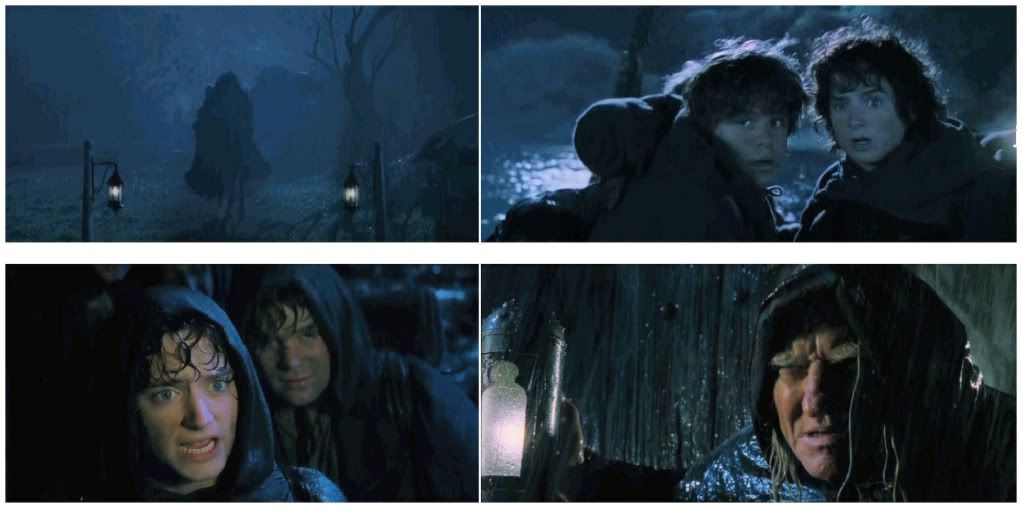
Scenes from Lord of the Rings, The Fellowship of the Ring (2001). Top: Flight from the Black Riders on the Bucklebury Ferry. Bottom: At the Gate of Bree.
So, where was Tom Bombadil? For years, we had a small sailing boat with the name Tom Bombadil because "bright blue his jacket is" (the blue canvas boat cover) "and his boots are yellow" (the yellowish-brown wooden hull of the boat). The source of another cherished quote was also missing: "fog on the Barrow Downs" (we used to recite that in a deep voice every time it was foggy). All this was unforgivable!
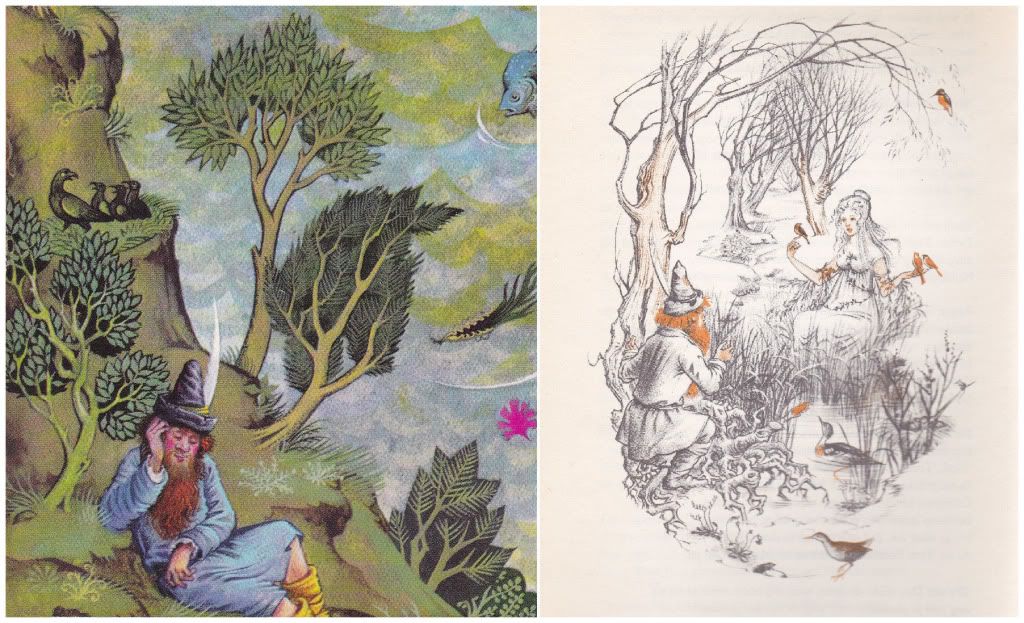
From: “De Avonturen van Tom Bombadil” by J.R.R. Tolkien, translated by Max Schuchart with illustrations by Pauline Baynes (Uitgeverij Bert Bakker, 1975).
Left: Back cover. Right: Tom with Goldberry
The next time I caught a glimpse on tv made it even worse. When reading the book chapters about Lothlorien you can feel the healing powers of the land and the Lady Galadriel. Tolkien's illustration "The Forest of Lothlorien in Spring" was stuck on my wall for a long time. It is just so beautiful.
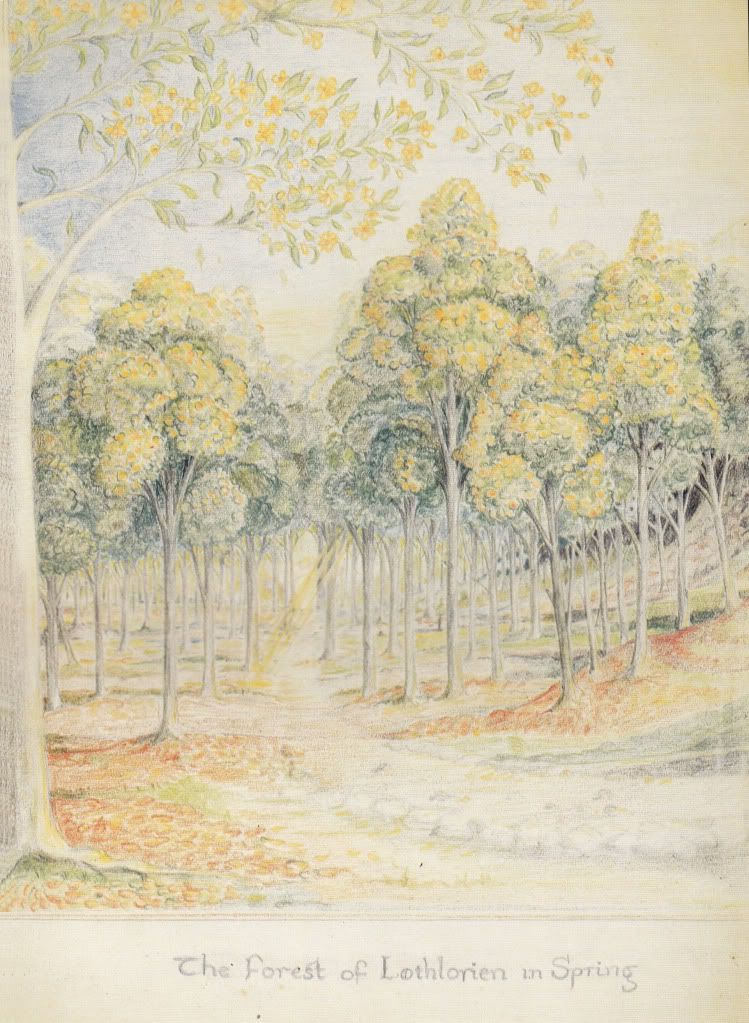
Drawing “The Forest of Lothlorien in Spring” (from: J.R.R. Tolkien, Artist and Illustrator
by Wayne G. Hammond and Cristina Scull, Harper Collins Publishers 1995)
When I saw the arrival of the Fellowship in Lorien on tv, I was reminded of Pauline Baynes' small drawing of Cerin Amroth (with Caras Galadhon in the background) that appears on her map of Middle Earth. So here the filmmakers seemed to have got it right! But the following scenes were all dark and ominous and I turned away in disgust.
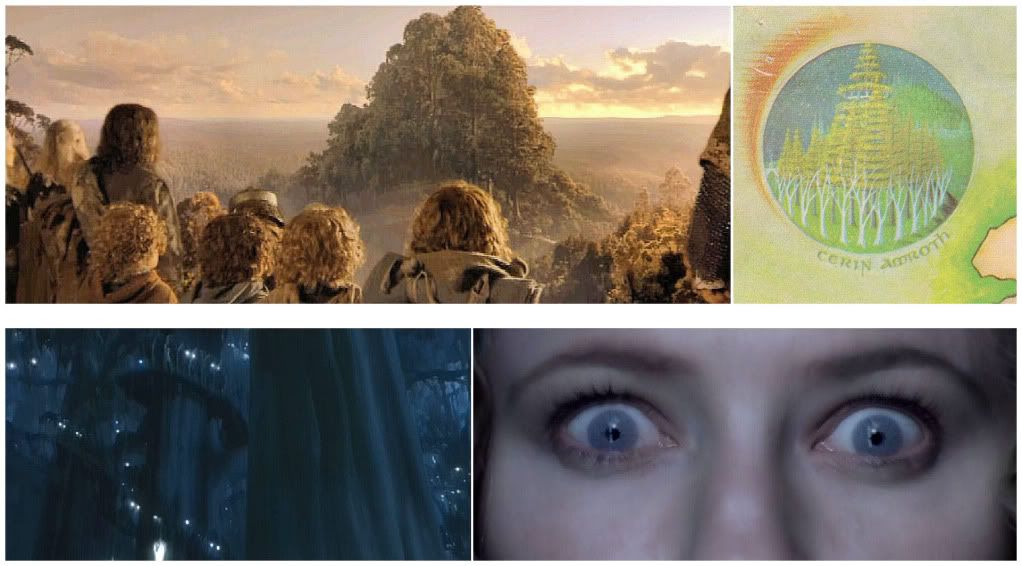
Scenes from Lord of the Rings, The Fellowship of the Ring (2001). Top left: First view on Caras Galadhon. Top right: Illustration by Pauline Baynes. Bottom left: Caras Galadhon by night. Bottom right: Galadriel confronts the Ringbearer. (NOTE: I must have seen a glimpse of the extended version because the first scene does not occur in the theatrical version. Or my memory is playing tricks on me.)
But that was not the end of the story. In the summer of 2010, curiosity finally got the better of me and, on impulse, I bought the DVDs. I loved the films and have now seen them many times. I even got over the absence of Tom. Here are some of my thoughts on the films.
Where the films failed
Not for me! But that's probably because I know the book so well. But, judging from all the comments I've read, it has been impossible to make the full impact of the corrupting power of the One Ring felt by "film-only" viewers. This is not surprising because it is much easier to describe that sort of thing than to show it. The screenwriters did try, for instance by changing Faramir's response to the Ring and by making Frodo a weaker character, an addict, who "offers" the Ring to the Nazgûl Lord and sends Sam away just because of Gollum's machinations. Not only did they alienate long-term LOTR-book fans with these changes, they also failed to convince many "film-only" viewers. Perhaps they should have chosen an alternative solution and just described the corrupting power of the Ring more fully and more often. I realize this is against the film dogma of "show, don't tell" but I can't help feeling it would have been a better solution.
Where the films succeeded
Here I'll just quote from Tom Shippey's book "The Road to Middle Earth: How J.R.R. Tolkien created a new mythology" (revised edition 2005; Harper Collins). He says it so well.
"Jackson may not have been able to cope with all the ramifications of Tolkien on Providence, but then few if any readers do. It is very difficult to say whether some parts of Tolkien's intention gets through to careless or less-comprehending readers: he would have hoped so, but there is no guarantee that he is correct. And meanwhile Jackson has certainly succeeded in conveying much of the more obvious parts of Tolkien's narrative core, many of them strikingly different to Hollywood normality - the difference between Prime and Subsidiary Action, the differing styles of heroism, the need for pity as well as courage, the vulnerability of the good, the true cost of evil. It was brave of him to stay with the sad, muted ending of the original, with all that it leaves unsaid."
Frodo
My main hero in Tolkien's tale has always been Frodo. For me, he represents the ultimate of self-sacrifice, suffering and heroism. (One of the best essays on the nature of Frodo's heroism I've ever read is here http://www.frodolivesin.us/archives/id21.htm ).
But my admiration for book-Frodo had always been rather abstract. I admired the idea, the concept. Only after seeing the films did Frodo really become alive for me. He became a hobbit of flesh and blood and his sufferings became tangible. I think this was mainly due to Elijah Wood's performance.
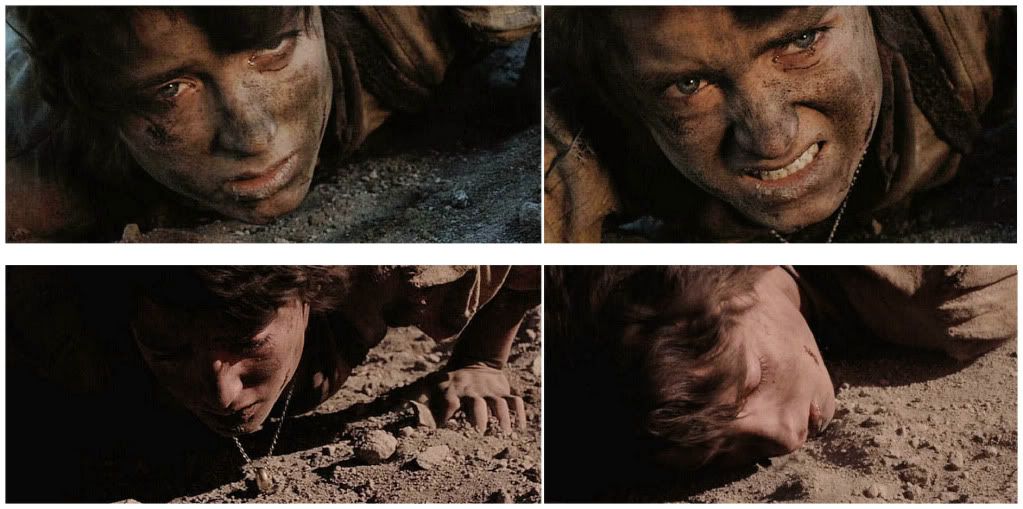
Scenes from Lord of the Rings, The Return of the King (2003). Quotes from the book that come to mind: Top images: "I'll crawl Sam, he gasped". Bottom images: "...and there he lay like a dead thing".
My empathy with film-Frodo was there right from the beginning, from the first time I saw the films. But I understood only gradually how important Elijah's performance was for the way I felt. I'll save the tale of how that happened for the next post. But that's how I eventually landed here on Live Journal.
(to be continued)
"they liked to have books filled with things they already know, set out fair and square with no contradictions".
The words "things they already know" are so true for this post. It's impossible to write anything new about Tolkien, Lord of the Rings, the book, the films, Frodo and his actor. So this is just my own, personal story.

The first step on my journey was set years ago, when I first read J.R.R. Tolkien's "In de Ban van de Ring" (in Dutch). I got the book from my buddies at work. It was a hard-cover, cloth-bound edition with attached bookmarker (very convenient as it was 1445 pages long) and it had this dust cover.

Cover of "In de Ban van de Ring" by J.R.R. Tolkien
translated by Max Schuchart (Uitgevery Het Spectrum, 1968)
Once I had read the book, I tried to figure out what these drawings could possibly mean. At the top I could see Frodo being carried off by the orcs, with Sam, brandishing Sting, in pursuit. I did not yet pick up the "great Elf-warrior" reference (which is what the artist must have intended for the shadowy figure looming above Sam). The scene at the bottom was clearly from the Prancing Pony, with Strider in the background and Frodo caught in his disappearing act. But the hobbits and the men of Bree were drawn as if this was a book for children but I already knew that it was nothing of the kind.
During the months that followed, I became completely absorbed by the world of Middle Earth. Once I had finished the book, I started right at the beginning again. I just could not let it go. Later on, when my English improved, I switched to the English version and then I discovered that the Dutch translator (although doing a great job) had made one serious mistake. During the Battle on the Pelennor Fields, when the lord of the Nazgûl threatens Eowyn he says:
"Come not between the Nazgûl and his prey! Or he will NOT slay thee in thy turn. He will bear thee away to the houses of lamentation, beyond all darkness, where thy flesh shall be devoured, and thy shriveled mind be left naked to the Lidless Eye".
The Dutch translator left out the word "NOT" in the second sentence. He evidently could not imagine the fate wose than death with which Eowyn is threatened here.

Eowyn threatened by the Lord of the Nazgûl (Illustration by Alan Lee; from his website)
I still read the English edition of LOTR frequently. Sometimes I have "read it to death" but, when I have changed as a person, I find I can read it again. I have also collected and read most of Tolkien's other books and I have quite a collection of Tolkieniana but I keep coming back to LOTR.
The next step on my journey was rather a negative one. I refused to watch Peter Jackson's films. I thought that watching the films would spoil my Middle Earth. Occasionally, I caught a snippet on tv. The first time that happened I saw the four hobbits arrive at the gate of Bree right after they had escaped from the Black Riders on the Bucklebury Ferry.

Scenes from Lord of the Rings, The Fellowship of the Ring (2001). Top: Flight from the Black Riders on the Bucklebury Ferry. Bottom: At the Gate of Bree.
So, where was Tom Bombadil? For years, we had a small sailing boat with the name Tom Bombadil because "bright blue his jacket is" (the blue canvas boat cover) "and his boots are yellow" (the yellowish-brown wooden hull of the boat). The source of another cherished quote was also missing: "fog on the Barrow Downs" (we used to recite that in a deep voice every time it was foggy). All this was unforgivable!

From: “De Avonturen van Tom Bombadil” by J.R.R. Tolkien, translated by Max Schuchart with illustrations by Pauline Baynes (Uitgeverij Bert Bakker, 1975).
Left: Back cover. Right: Tom with Goldberry
The next time I caught a glimpse on tv made it even worse. When reading the book chapters about Lothlorien you can feel the healing powers of the land and the Lady Galadriel. Tolkien's illustration "The Forest of Lothlorien in Spring" was stuck on my wall for a long time. It is just so beautiful.

Drawing “The Forest of Lothlorien in Spring” (from: J.R.R. Tolkien, Artist and Illustrator
by Wayne G. Hammond and Cristina Scull, Harper Collins Publishers 1995)
When I saw the arrival of the Fellowship in Lorien on tv, I was reminded of Pauline Baynes' small drawing of Cerin Amroth (with Caras Galadhon in the background) that appears on her map of Middle Earth. So here the filmmakers seemed to have got it right! But the following scenes were all dark and ominous and I turned away in disgust.

Scenes from Lord of the Rings, The Fellowship of the Ring (2001). Top left: First view on Caras Galadhon. Top right: Illustration by Pauline Baynes. Bottom left: Caras Galadhon by night. Bottom right: Galadriel confronts the Ringbearer. (NOTE: I must have seen a glimpse of the extended version because the first scene does not occur in the theatrical version. Or my memory is playing tricks on me.)
But that was not the end of the story. In the summer of 2010, curiosity finally got the better of me and, on impulse, I bought the DVDs. I loved the films and have now seen them many times. I even got over the absence of Tom. Here are some of my thoughts on the films.
Where the films failed
Not for me! But that's probably because I know the book so well. But, judging from all the comments I've read, it has been impossible to make the full impact of the corrupting power of the One Ring felt by "film-only" viewers. This is not surprising because it is much easier to describe that sort of thing than to show it. The screenwriters did try, for instance by changing Faramir's response to the Ring and by making Frodo a weaker character, an addict, who "offers" the Ring to the Nazgûl Lord and sends Sam away just because of Gollum's machinations. Not only did they alienate long-term LOTR-book fans with these changes, they also failed to convince many "film-only" viewers. Perhaps they should have chosen an alternative solution and just described the corrupting power of the Ring more fully and more often. I realize this is against the film dogma of "show, don't tell" but I can't help feeling it would have been a better solution.
Where the films succeeded
Here I'll just quote from Tom Shippey's book "The Road to Middle Earth: How J.R.R. Tolkien created a new mythology" (revised edition 2005; Harper Collins). He says it so well.
"Jackson may not have been able to cope with all the ramifications of Tolkien on Providence, but then few if any readers do. It is very difficult to say whether some parts of Tolkien's intention gets through to careless or less-comprehending readers: he would have hoped so, but there is no guarantee that he is correct. And meanwhile Jackson has certainly succeeded in conveying much of the more obvious parts of Tolkien's narrative core, many of them strikingly different to Hollywood normality - the difference between Prime and Subsidiary Action, the differing styles of heroism, the need for pity as well as courage, the vulnerability of the good, the true cost of evil. It was brave of him to stay with the sad, muted ending of the original, with all that it leaves unsaid."
Frodo
My main hero in Tolkien's tale has always been Frodo. For me, he represents the ultimate of self-sacrifice, suffering and heroism. (One of the best essays on the nature of Frodo's heroism I've ever read is here http://www.frodolivesin.us/archives/id21.htm ).
But my admiration for book-Frodo had always been rather abstract. I admired the idea, the concept. Only after seeing the films did Frodo really become alive for me. He became a hobbit of flesh and blood and his sufferings became tangible. I think this was mainly due to Elijah Wood's performance.

Scenes from Lord of the Rings, The Return of the King (2003). Quotes from the book that come to mind: Top images: "I'll crawl Sam, he gasped". Bottom images: "...and there he lay like a dead thing".
My empathy with film-Frodo was there right from the beginning, from the first time I saw the films. But I understood only gradually how important Elijah's performance was for the way I felt. I'll save the tale of how that happened for the next post. But that's how I eventually landed here on Live Journal.
(to be continued)